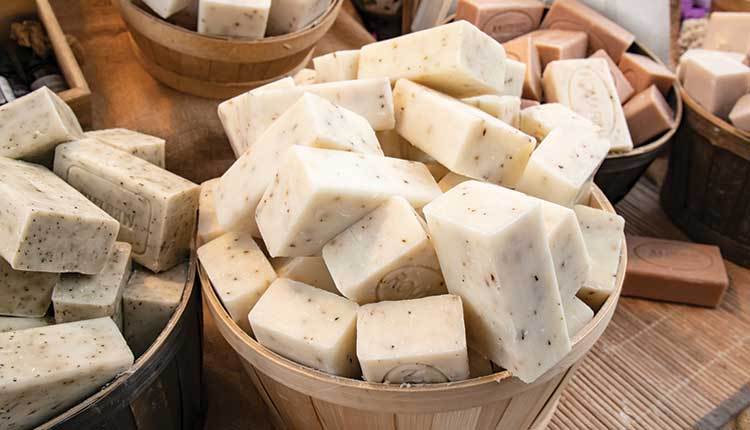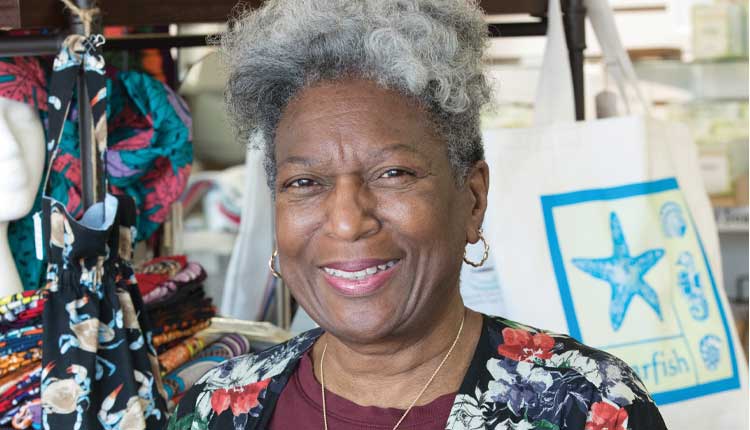Smart coastal stores keep their shelves and check out areas stocked with lotions, ointments and gels, balms and more that offer protection and relief from the sand, sun and saltwater. These items are beach necessities for the hair and skin, which can take a beating after a day of sunning and swimming. But health and beauty products can go beyond the basic needs of beachgoers and toward products that pamper customers and indulge the senses.
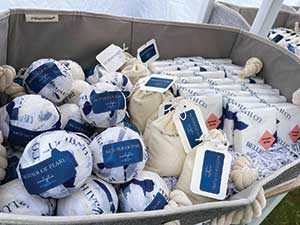
Prettily packaged bath bombs from Beluga Bath double as decor.
“There is a growing demand for organic content and high-quality spa products that you don’t normally find out of that space,” says David McCord, founder of Maui Vera, of coastal shops. His organic spa company offers natural sunscreens and sunburn relief products that also appeal to customers’ desire for simple, natural ingredients.
“We try to go the cleanest route possible — how skin care should be — very simple,” he says.
Danielle Conte of Conscious Coconut says, “There is no greater place to recognize the need to minimize our impact on the environment than near the coast. Between product ingredients that are harmful to our oceans and wildlife to the damage that wasteful packaging leaves behind, it’s imperative to move toward plant-based, organic products and biodegradable or recyclable packaging.”
Brook Gramann of Lanikai Bath and Body, which owns a shop in Kailua, Hawaii, and offers its products wholesale, agrees, “Customers are also looking for a company that uses recycled paper, cardboard or plastic, not a lot of excessive packaging, too.”
When health and beauty companies partner with charitable organizations, it makes the products even more meaningful, says Darin Trimble, principal at True Ocean LLC.
His company ‘s bath and body collection is made from mineral-rich seawater. “We continue to see growth in sustainability and eco-friendly, including ‘for profit’ organizations partnering with non-profits to help them achieve goals related to critical issues such as climate change and pollution,” he says.
There are many options when stocking a health and beauty section, from beach-must haves to products that are designed to remind customers of a tropical escape.
Soaking up the benefits
Customers appreciate simplicity in their health and beauty regimens, according to Gramann. Lanikai’s Kukui lotion doubles as a lightweight, fragrance-free makeup base.
“An all-in-one lotion, wash or cream that is easy, simple to use and offers loads of benefits is appealing,” Gramann says.
Products containing cannabidiol, a hemp-derived compound known for anti-inflammatory and neuroprotective properties, are another way coastal shops can offer destressing, antioxidant-rich face and body care.
“CBD skin care products help address skin issues like dry skin, itchy skin and fine wrinkles,” says Sara Dewberry spokesperson for Naples Soap Co., which offers an array of CBD products, including bath bombs, pain relief cream, facial oils, dry body oils and patches with hemp extract.
Shopping with the eyes
Health and beauty products aren’t just sitting in a makeup bag anymore. “As people are home more often now, they are changing the decor in each room, and the bathroom is no exception,” says Laura Hatt, creator of Dolphin Wood House. “In the past, customers were okay with a single-color soap bar in any color as long as they liked the fragrance. Now I have customers who like my fragrances but also look for designs and different colors.”
Hatt says consumers are “not only shopping with their noses but their eyes also.”
Color attracts buyers. They associate a hue with their home’s decor and then sniff to see if it’s a real fit. In fact, some customers’ main purpose for purchasing the soap is as decor. Shower bombs displayed on a shelf are also a way the bath products double as an aesthetic boost to a bathroom.
“Yes, the color goes down the drain and will not color your water as a bath bomb will, but when you have the shower bombs sitting on a shelf or in a cute basket, that little bit of color gives a room an extra pop,” Hatt says.
Hatt produces her own soaps through Dolphin Wood House and creates products for soap makers using their recipes. She sees her business expanding. “Sales are up and people are spending more money on luxury and impulse buys,” she says.
And because visitors spending time by the water want to take home mementos, “nothing reminds a person of a special place or memory like a fragrance,” Hatt says. “When you take a shower, you do a lot of uninterrupted thinking, but smell that bar of soap with the pretty bright colors and you can be instantly transported back to the time on the beach when you and your loved ones were sitting on the warm sand in the sunshine, eating fresh vanilla ice cream, while the waves lap at your feet and you’re laughing together.”
Beluga Bath notes a demand for bath and shower bombs. “There are peaks for both products,” Kelly Orts says. “Most individuals enjoy bath bombs during the winters and shower bombs during the summers. Either way, you add a special treat to a daily ritual that can make it feel more luxurious.”
Scents-ability
Plant-based and skin-friendly fragrances are in demand. “Natural products must also offer real therapeutic benefits for the skin, as well as contribute to a customer’s wellbeing,” Gramann says. “Our fragrances are authentic to the fruit or flower and are light.”
Especially for sensitive skin, attention to fragrance ingredients is crucial, according to Danielle Sterling, owner of Sugared Mango Soap Shop in Virginia Beach, Virginia.
“Fragrance is the main sensitizer for most people, so our products are low in fragrance and plant-based except for one product, the I’m Not Vegan tallow soap,” Sterling says.
Some want assurance that there are no palm oil ingredients in products, Sterling says. “That’s because it adds to deforestation of tropical areas.”
Low-maintenance hair
Another trend on the rise in the health and beauty department is low-maintenance yet luxurious haircare routines, according to Conte. “Customers are embracing their natural hair texture by straightening and curling only when necessary,” she says. “This not only saves time but is also in response to fear of damage or hair loss.”
Seaside retailers can support their customers with this offering by stocking natural air-drying products like salt spray as well as color and preswim protectants.
Product education helps shop owners sell innovative health and beautiful products. Conte gives retailers tips to share with customers such as running coconut oil through the hair before a swim.
“This creates a shield against chlorine, sun and saltwater, which damages even the healthiest hair,” she says. She adds that coconut oil has a natural SPF of 4 to 6.
Savvy sunscreens
Roughly 55 gallons of chemicals seep into the waters of Maui everyday — from sunscreen. The number sounds astounding, but McCord says it’s not surprising “when you figure how much tourism we have here.”
Hawaii recently banned two ingredients commonly found in many sunscreens: oxybenzone and oxtinoxate. Both are known to suffocate coral reefs when leaked into oceans, leading to coral bleaching and defects in sea life reproduction.
“Really, there’s a push for everyone to get on board with reef-friendly mineral sunscreens that step away from chemicals that are in sunscreens and cosmetics, in general,” McCord says.
“It’s a slow movement but it’s picking up steam. And it’s not just about reefs — it’s in our pools, lakes and absorbing into our skin.”
McCord and his company Maui Vera are collaborating with marine biologists that are studying these ingredients in sunscreen and cosmetics. “They will come out with some interesting information as they get deeper into it,” he says. Sea urchins are a current focus.
Maui Vera products are paraben-free, do not contain the two banned chemicals, and include essential oils rather than fragrance.
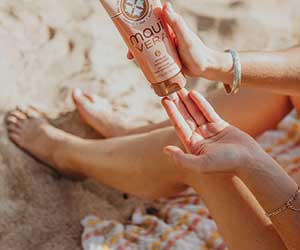
Maui Vera mineral sunscreen is a reef- friendly, clean, chemical-free solution.
Kjell Ellefson of Aloe Up agrees buyers are more conscious about the sunscreens they purchase. “They want to use a product that is good for them and for the environment,” he says. “They are informed about ingredients and how they affect their health and the world around them, so it is more important than ever for retailers to pay attention to what sorts of sourcing and initiatives the products they are carrying have.”
Ellefson also sees a trend toward easy-to-use sunscreens as well — spray and go — “even though a lotion sunscreen can be two to three times more effective.”
Inspired by the ocean
Goat’s milk and olive oil are staple ingredients in The Grecian Soap Co.’s products, which are free of parabens, sulfates and harsh chemicals. Those with skin conditions like eczema and psoriasis rave about the creamy, gentle bars, lotions and butters, says founder Steven Stamatis.
The company pairs its products with sustainably harvested sponges from the Gulf of Mexico and the Bahamas that are absorbent, antibacterial and long lasting. “The natural sea sponges in many of our products are a built-in scrubber,” Stamatis points out.
Retailers can take advantage of health and beauty product companies’ display sets to showcase products. It’s especially helpful when there is information about the products’ ingredients and benefits. “That makes customers more attracted to it,” Stamatis says.
“There is a growing demand for organic content and high-quality spa products that you don’t normally find out of that space.” – David McCord, Maui Vera
Ocean-inspired bath and body products give vacationers a way to relive their time by the coast after they return home. And the sensory aspect of health and beauty conjures up good vibes.
Ellefson says grab-and-go products across all health and beauty categories, from sunscreen to cosmetics, can be a large income generator. “With travel volumes returning to normal or steady growth levels, it is more important than ever for seaside retailers to be on top of their game,” he says.
Necessary luxuries
A benefit of bath and body is consumers’ consistent interest. “They are always seeking out high-quality bath and body, wellness and skin care products that are beneficial, help them feel good and look good,” Gramann says. “We call these ‘life’s necessary luxuries.’”
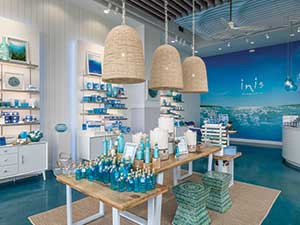
Inis the Energy of the Sea’s bath salt bar immerses customers into the experience.
Karen Wilkinson, marketing director, Fragrances of Ireland (USA), makers of the Inis Energy of the Sea line, suggests,“Try a compact assortment and display, especially when first trying out a new brand. Plus, testers!”
Health and beauty products complement seaside retailers’ offerings as a high-margin product that requires little shelf space, Trimble points out. “It also provides high sell through rates,” he says. “Retailers are looking for products that can’t be found at every corner shop and are branded or labeled in a way that represents the town or region.”
Another appeal of bath and body lines, notes Trimble, is they can be used immediately, “similar to purchasing a T-shirt or dress to wear out that evening.”
“A customer can apply a product such as a body spray, which they bought that afternoon at a coastal shop. The immediate benefit enhances the purchasing experience and, frankly, is more fun!” he says.
And because the many health and beauty products are used daily, customers are constantly reminded of their visit.
Leave a lasting impression on your customers with products that help them reap the healthy benefits and keep their beloved beach vacations front of mind.
